 |
The
Art of Paul Dini
Posted:
June 14, 2001
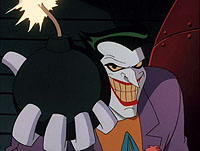 As
a creative contributor Paul Dini has his name stamped on more than thirty
episodes of Batman, from The Animated Series to Beyond;
nineteen of these credit him as sole author. He has acted as producer,
story editor, and (in Batman Animated and numerous funny and articulate
interviews) ambassador to the fan base. He created Harley Quinn. These
facts alone would endear the fans, even if some of the most adored episodes
of the various series ("Heart of Ice,"
"Over the Edge," "Out
of the Past") did not have his name on them.
As
a creative contributor Paul Dini has his name stamped on more than thirty
episodes of Batman, from The Animated Series to Beyond;
nineteen of these credit him as sole author. He has acted as producer,
story editor, and (in Batman Animated and numerous funny and articulate
interviews) ambassador to the fan base. He created Harley Quinn. These
facts alone would endear the fans, even if some of the most adored episodes
of the various series ("Heart of Ice,"
"Over the Edge," "Out
of the Past") did not have his name on them.
But not everyone is impressed. Tim "Two-Face" Leighton, for instance. "Dini's got talent, that's a given," the editor of Batman: The Animated Newsletter wrote back in issue 40. But "he sure as hell isn't using it these days." Though claiming great respect for Dini's pre-1994 efforts, Leighton decries a subsequent lightening of style: "Long gone were Dini's in-depth scripts, delving into the human psyche; now all his scripts were filled with lame jokes and cheap sex shows."
To which the obvious retort is: What's wrong with lame jokes and cheap sex shows?
OK, that's a poor response, a mere appeal to personal preferences. And there's substance behind Leighton's complaint; like most Batman watchers, he assumes Dini has only two modes, Tragic and Comic. Thus, he (and others) conclude, given that Batman and his antagonists are dark psychological characters inhabiting a dark universe, they are cheapened when placed in a light, frolic-some story like "Joker's Millions" or "Harlequinade."
This is a coherent and plausible attack, and to defend Dini (and those episodes), I'm going to have change the terms around. So instead of two modes, I'm going to argue that Dini's got three: what I'll call "Heavy Psychodrama" (represented by "Mad as a Hatter"), "Light Psychodrama" ("Joker's Millions") and "Artifice" ("Almost Got 'Im"). Understand this, and you'll understand why the funny episodes, though not to all tastes, are not the horrible betrayals a lot of people take them to be.
When people praise Dini, it's usually for those stories with tragic, sympathetic villains like Mr. Freeze. Of course, Dini isn't the only Batman writer to make his villains sympathetic, and you can get an argument going over whether he has written the best of the kind. (Alan Burnett and Randy Rogel's "Two Face" justly has its champions.) But Dini's efforts are distinctive for their relentless interiority: In his scripts, the protagonist (usually a villain but sometimes a supporting character) is a victim of his or her own illusions, and the stories turn into a cautionary tale about the dangers of self-deception.
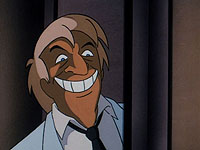 Take
"Mad as a Hatter." Jervis Tetch
starts (and ends) sympathetically, as a man in love with a girl who is
by no means outside his class. That is, he is not a freak or a maniac,
only a shy man progressively overwhelmed by his insecurities. His is a
tragedy borne of a failure of imagination—he simply cannot picture
Alice loving him as he is. And that tragedy only deepens when, instead
of changing himself (or his self-image), he tries to change the world
so that it will compensate for his perceived weaknesses (by turning people
into his admiring slaves); and his ruin is completed when he ends up preferring
the illusion of love to the real thing. This is how what was originally
a purely psychological delusion leads to the tragic deformation of the
real world, and how the action of the episode doubles as the dramatic
expression of Tetch's inner turmoil.
Take
"Mad as a Hatter." Jervis Tetch
starts (and ends) sympathetically, as a man in love with a girl who is
by no means outside his class. That is, he is not a freak or a maniac,
only a shy man progressively overwhelmed by his insecurities. His is a
tragedy borne of a failure of imagination—he simply cannot picture
Alice loving him as he is. And that tragedy only deepens when, instead
of changing himself (or his self-image), he tries to change the world
so that it will compensate for his perceived weaknesses (by turning people
into his admiring slaves); and his ruin is completed when he ends up preferring
the illusion of love to the real thing. This is how what was originally
a purely psychological delusion leads to the tragic deformation of the
real world, and how the action of the episode doubles as the dramatic
expression of Tetch's inner turmoil.
Tetch knows what he wants but drives himself toward an unsatisfactory substitute. So too with Mr. Freeze in "Heart of Ice" and Poison Ivy in "House and Garden." Each misses and yearns for domestic bliss and each pursues a wholly unacceptable substitute: Ivy constructs a vegetative fraud while Freeze dams his emotions behind frozen tears and misdirects his grief toward sterile revenge. But Dini also writes stories of tragedies averted. In "Joker's Favor," Collins, the Joker's victim and catspaw, spends most of the episode believing that success lies in escaping from the Joker. But an escape would be unsatisfactory because in fleeing Collins is also running away from his own sense of self-respect. Fortunately, he realizes this in time and turns to confront and beat the Joker on his own terms. Similarly with "Over the Edge," which is explicitly a psychotic episode played out in the mind of a character who is unsure of who she is and of how she should fit into the world.
The moment that stands as metaphor for these characters and their necessary choices occurs in "Baby-Doll," when Mary Dahl confronts her own reflection in a funhouse mirror and for once sees herself as she wants to be. That is, she has a choice: Either she can see herself for what she is, and accept or try to change herself; or she can try to warp the world so that it casts back the illusion of a preferred reality. Collins and Barbara Gordon reassess their lives, but Dahl, Tetch, Freeze and Ivy prefer illusion and suffer accordingly.
These are serious stories, not because they lack humor or rely on pathos, but because they illustrate a serious theme, the havoc that can result from a dangerous lack of self-knowledge and the unwillingness to confront oneself unsparingly. They also stand as displaced examinations of Batman's own predicament. Like these characters, he must continually reappraise himself and his own motivations and resist the temptation to let illusion substitute for a healthy appreciation of reality. Dini's contribution lies both in strengthening the title character (by implicitly comparing his psychological success with the villains' failures) and in treating Gotham not merely as a hellhole of psychos and oddballs but a suburb of the real psychological and moral universe we inhabit.
Usually, an episode like "Heart of Ice" will be contrasted (favorably) with one like "Harlequinade," because the former is serious and the latter comic. But if "Heart of Ice" is merely a particularly dark instance of Dini's desire to probe the psychology of his characters, then the real contrast should be with something completely lacking in character and psychology: something like "Almost Got 'Im."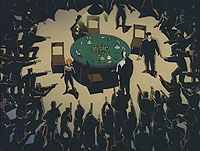 That
episode is a game, and a game only, on every level: villains at a card-game,
swapping stories about the fun they've had trying to "get" Batman,
with one of them being Batman in disguise, playing along so he can find
out where the Joker has stashed the kidnapped Catwoman. And Dini's playing
a game too, abandoning story and psychological exploration so he can tease
us with the games that comic books play to keep our attention. By giving
us a series of set-pieces and climaxes, with neither set-up nor pay-off,
he kiddingly accuses us of having only the shallowest kind of interest
in cartoon adventure.
That
episode is a game, and a game only, on every level: villains at a card-game,
swapping stories about the fun they've had trying to "get" Batman,
with one of them being Batman in disguise, playing along so he can find
out where the Joker has stashed the kidnapped Catwoman. And Dini's playing
a game too, abandoning story and psychological exploration so he can tease
us with the games that comic books play to keep our attention. By giving
us a series of set-pieces and climaxes, with neither set-up nor pay-off,
he kiddingly accuses us of having only the shallowest kind of interest
in cartoon adventure.
It's a highly stylized episode, which by manipulating story and character in artificial ways emphasizes the artificial nature of the comic-book genre. "Holiday Knights" is another instance, which by concentrating on the absurd notion that criminal loonies should tailor their plots to the particular season impudently reminds us of the way that villains glom onto and exploit a schtick to all lengths. "Joker's Wild" asks us to root for the Joker and so teases us into admitting that, secretly, we often want to see the bad guy win. And "The Man Who Killed Batman" reminds us that absurd heroics require an absurdly over-endowed hero and does so by giving us the adventure while keeping the hero off-screen as much as possible.
These are remarkable and entirely successful attempts to explore the limits of genre: By concentrating on the conventions that sustain it, these episodes remind us that it works only through the awesome suspension of disbelief and tempts our capacity for disbelief (and hence our capacity to enjoy the genre) by presenting wildly stylized stories. A proper enjoyment of these stories presupposes a certain distance between story and audience, the better to appreciate the games being played. But there's also an attendant risk that they will create just such a distance and wind up confusing or alienating the audience. So it is quite remarkable that these episodes haven't provoked much outrage.
Instead, that anger usually gets directed at Dini's third mode, that typified by "Harley's Holiday, " "Joker's Millions," and "Harlequinade." These episodes strike many viewers as ill-conceived or -constructed (a fact I grant with the oxymoronic label I apply to them—how can a "psychodrama" be "light"?) The problem is that they focus on their characters in a way that mocks or trivialize them.But if I am right, in these stories Dini actually combines the structures and purposes present in the other two types: These are psychological episodes organized around the suffering of a central character, but that suffering only reveals how shallow the characters are and how shallow the genre can be.
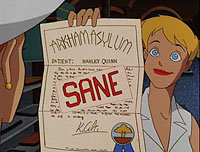 So,
like "Mad as a Hatter," "Harley's
Holiday" is structured as the psychological exploration of a
particular character. Harley Quinn, released from Arkham but still trapped
inside her own reality, is altogether oblivious to the effect she has
on the outside world, and the episode goes on to show what happens when
inner and outer realities collide so that even innocent misunderstandings
lead to large complications. Thus, as in the "heavy" psychodramas,
the external plot is entirely driven by Harley's inner turmoil; unwittingly,
she warps the world into an image of how she imagines it is or should
be. But the episode is "light," not because it has a funny tone
("Joker's Favor" is also quite
funny), but because the world she creates is trivial and unrealistic.
The story makes Harley as psychologically complex as Freeze or Tetch,
and it relates her to the world in the same way they are related to theirs.
But because her actions have only cartoony consequences, her predicament
cannot be treated with the same seriousness. Psychological exploration
can make a character and her world deep; equally, as proved here, they
can make it shallow.
So,
like "Mad as a Hatter," "Harley's
Holiday" is structured as the psychological exploration of a
particular character. Harley Quinn, released from Arkham but still trapped
inside her own reality, is altogether oblivious to the effect she has
on the outside world, and the episode goes on to show what happens when
inner and outer realities collide so that even innocent misunderstandings
lead to large complications. Thus, as in the "heavy" psychodramas,
the external plot is entirely driven by Harley's inner turmoil; unwittingly,
she warps the world into an image of how she imagines it is or should
be. But the episode is "light," not because it has a funny tone
("Joker's Favor" is also quite
funny), but because the world she creates is trivial and unrealistic.
The story makes Harley as psychologically complex as Freeze or Tetch,
and it relates her to the world in the same way they are related to theirs.
But because her actions have only cartoony consequences, her predicament
cannot be treated with the same seriousness. Psychological exploration
can make a character and her world deep; equally, as proved here, they
can make it shallow.
Similarly for "Joker's Millions." That one starts with the Joker honorably plying his craft in difficult circumstances (he's broke) and then tempts him into abandoning his true calling (the life of crime) by bestowing on him inordinate wealth. When that wealth evaporates he must again adapt, this time by returning to crime while also abandoning his usual style of robbery. Psychologically, this is quite sound: Dini doesn't cause the Joker to act uncharacteristically (it's not like he suddenly starts going to church); he merely gives him an extraordinary opportunity and lets him react in a plausible manner. And the Joker reacts plausibly again when circumstances change: To avoid exposure and humiliation in the eyes of his fellow rogues, he must humiliate himself in his own eyes by forgoing his trademark schtick. So Dini doesn't betray the Joker; the Joker betrays himself through a series of foolish choices. He's just like Tetch in this regard. Both lose sight of who they really are and end up destroying themselves. The difference is that Tetch starts off as a real, recognizable human being, so that his fall (however bizarre in consequence) reminds us of our own fragility. But the Joker is entirely a creature of a cartoon universe, and his fall is only a departure from that starting point, and so it only reminds us of how artificial that universe is.
These episodes show that, for Dini, character is the gravity well that shapes the universe and character development the logic that guides the story. Because Harley is fundamentally a comic character, her presence will bend the rules like rubber, and when her presence is central she will pull down its walls in cosmic, comic calamity. And when an unrealistic character like the Joker violates his own rules, he will make nonsense of everything he touches.
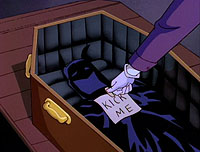 "Harlequinade"
is the ultimate demonstration. Surely the stakes are serious: an atom
bomb, slated to take out Gotham, while the mayor is missing in action.
So is the conflict: Harley must decide whether to betray the Joker. And
the revelations are dramatic: The Joker was prepared to abandon Harley
to the bomb blast. But the payoff is a raspberry: lots of slapstick, a
silly song, and an iris out in the shape of a heart. In fact, for those
who like their Batman straight up without seltzer water, "Harlequinade"
can probably only be stomached as some frenzied fantasy suffered by Harley:
Locked away in Arkham, she daydreams about what Puddin' is up to, and
plays out the scenario according to her own demented logic. But this would
only prove my point in a round-about way: when Dini is on the hunt for
the key to his characters, there is no difference between the character's
psychology and the kind of universe he or she lives in.
"Harlequinade"
is the ultimate demonstration. Surely the stakes are serious: an atom
bomb, slated to take out Gotham, while the mayor is missing in action.
So is the conflict: Harley must decide whether to betray the Joker. And
the revelations are dramatic: The Joker was prepared to abandon Harley
to the bomb blast. But the payoff is a raspberry: lots of slapstick, a
silly song, and an iris out in the shape of a heart. In fact, for those
who like their Batman straight up without seltzer water, "Harlequinade"
can probably only be stomached as some frenzied fantasy suffered by Harley:
Locked away in Arkham, she daydreams about what Puddin' is up to, and
plays out the scenario according to her own demented logic. But this would
only prove my point in a round-about way: when Dini is on the hunt for
the key to his characters, there is no difference between the character's
psychology and the kind of universe he or she lives in.
Not every one of Dini's scripts can squeezed into these categories; the ones I've described only mark the outer boundaries of his style. But by understanding the scope of his concerns and techniques we can understand how he can have such breadth and can work such breadth into individual scripts. So in "Harley & Ivy" he easily combines drama, psychological insight, and pratfalls because in real life these are not necessarily strangers to each other. That episode studies Harley's relationship with the Joker, and it becomes both funnier and more mordant as Dini piles on the astutely observed psychological detail. Harley's girlishly secretive phone calls, when juxtaposed with the Joker's blasé indifference as he preens in a mirror, is highly revealing of both characters, even as what it reveals causes us to laugh.
It must also be admitted that Dini occasionally falls from his own high standards. "Trial" is a rare miscalculation, because it mixes discordant characters in an indiscriminate fashion. "Zatanna" fails because, although it has the motifs for misperception, misdirection and misrepresentation, it lacks a central character to integrate and ground them. And "The Worry Men" is just a slick, cold-blooded adventure yarn.
So how should we approach Paul Dini? Certainly not on bended knee: One can accept everything I've said above and still dislike certain tendencies in his work. Nonetheless, he still deserves our highest respect. For despite writing in a rigorously conventional genre in an unrespected field for an unforgiving medium he has remained highly discerning of what the stories and characters need, and almost pitch perfect in his realization of that vision.